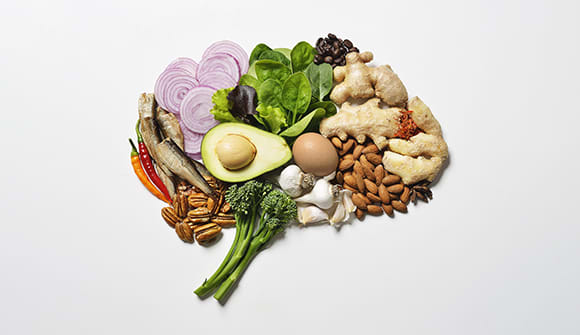Eat your way to better mental health
A healthy diet can improve mood, reduce anxiety and boost mental clarity.
Article Date:

Would you fill your car's gas tank with soda and expect it to continue taking you to and from work?
Of course, you wouldn't – and the question itself seems silly. Why? Because that's not what your car runs on, and it definitely isn't what the vehicle needs to maintain a healthy engine.
Your brain is the same. When you feed your body a clean, healthy diet, brain function improves. Not just mental clarity, either. Food can help reduce depression, eliminate anxiety and boost energy levels.
In fact, Karen McNeely, DNP, ARNP-BC, with Baptist Behavioral Health, said the old adage is true: You are what you eat.
The impact of nutrition on emotional well-being
"We know there is a direct line of communication between the brain and the gastrointestinal tract," McNeely said. "We're also learning more every day about the role of inflammation in psychiatric disorders, particularly depression and anxiety. So, we believe diets should be rich in foods that promote cellular health and reduce that inflammation."
Some mood-boosting foods include bananas, oats, blueberries, avocados, spinach, eggs, walnuts and even dark chocolate.
These actually increase serotonin in the body. The right amount of this neurotransmitter (a chemical that allows cells to communicate) produces a relaxed and positive feeling, and it's responsible for regulating things like appetite and sleep. However, around 90% of serotonin in our bodies is found in the gut.
"What we eat can determine how we feel, but the opposite is also true," McNeely said. "How we feel can determine what we eat. It's important to eat a variety of healthy foods as they all have a different effect on our brains."
Carbohydrates increase serotonin, which is likely why people crave carbohydrate-rich foods when they're stressed. Protein-rich food, on the other hand, increases the neurotransmitters dopamine and norepinephrine. Both play a role in aiding mental acuity.
Practical tips for eating mindfully
So, how do you give your body the food it needs? A couple of quick tips will help defog your mind and improve your mental health:
- Space each meal and snack approximately 3 to 4 hours apart.
- Always eat a healthy protein and carbohydrate at each meal.
- Keep track of the foods that make you feel healthy, along with those that make you feel down.
Eating a wide variety of foods, including whole grains, fruits and vegetables, will provide the nutrients needed to support a healthy mind and body.
"Even small changes make a difference because they often lead to bigger changes. Mindful eating is the best way to integrate these changes," McNeely said.
She added, "Good nutrition is an important component of an improved mood and an increased sense of well-being, but it's not a substitute for medical care."
Discover how your diet can enhance your health
Want to know more about how healthy changes to your diet can positively impact your health? Your primary care doctor can help. To learn more about services from Baptist Primary Care, call 904.202.4YOU (4968) or fill out the appointment request form.



